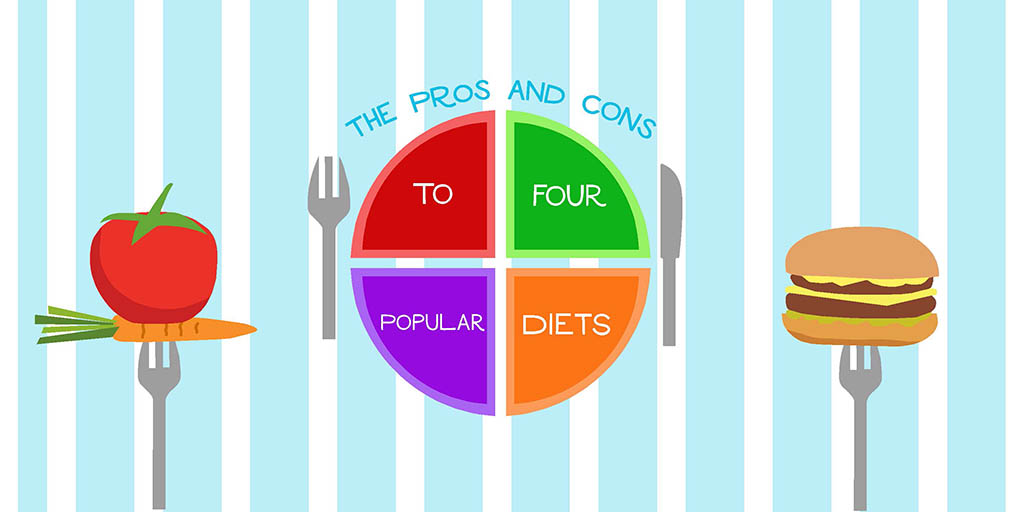The pros and cons to four popular diets

In an effort to lose weight many people take to dieting to get the job done. Considering weight loss is 70 per cent diet and 30 per cent exercise it is important to eat healthy food if you are trying to lose weight. However, some diets go to the extreme and can cause more harm than good to your body. This is a look into four popular diets and why they may or may not be beneficial to your health. Keep in mind that everyone is different so these ideas are based on research of the average person and if you are planning to go on a diet you may want to consult your doctor first.
Mediterranean Diet
This diet came to be when evidence was found showing that people who live close to the Mediterranean Sea are healthier, live longer and have less body fat. It focuses on eating fruits and vegetables, whole grains, nuts, olive oil, herbs and spices and seafood. An added benefit is that a glass of red wine per day is recommended. This diet suggests limiting processed foods, red meat and foods that are high in sugar. The Mediterranean diet has shown long-term results and is easier to follow compared to other diets as it does not have a strict meal plan. According to the American Heart Association (AHA), the Mediterranean diet decreases the risk of heart disease and contains a large amount of antioxidants to prevent cancer. One of the cons of the Mediterranean diet is that it does not outline the specific amount of each food to consume, but instead it just uses broad terms for measurement such as “low intake” or “abundance”.
Vegan Diet
A vegan diet is popular for social reasons, but some people follow this diet as a strategy to lose weight or for other health reasons. A vegan diet excludes foods that come from animals such as meat, eggs and milk products. One of positives of this diet is that vegans tend to consume less saturated fats and calories which reduces their chance of gaining weight and/or developing type two diabetes or cardiovascular disease. One of the risks of being on a vegan diet is not getting enough protein, but if you plan your meals properly you can get enough protein from plant-based food products.
Intermittent Fasting
There are a variety of intermittent fasting diets which all involve restricting or not eating food for short periods of time. After 12 hours of fasting your body begins to access fat stores for energy that are inaccessible on a regular eating schedule. Three of the intermittent fasting diets include alternate day fasting which is fasting every other day, time restricted fasting where you only eat within a certain time period each day and whole day fasting where you have one to two fasting days per week. One of the benefits of a fasting diet is that these cycles of eating and not eating can help reduce fat and control insulin levels. According to healthguidance.org, one of the cons to fasting is that your body will have a lack of protein cells to access. Fasting can cause low blood pressure and a drop in your body's blood levels in sugar and iron which can lead to feelings of fatigue and dizziness.
Keto Diet
The Keto Diet involves eating foods that put you into a state of ketosis which is when your body is fueled completely by fat. The Keto Diet is broken down to 75 per cent fat, 20 per cent protein and five per cent carbohydrates. Reducing sugar intake will allow you to have a higher energy level and less of a desire to eat. In addition to weight loss, there have been studies to show that this diet benefits people in a number of other ways including regulating mood in people with bipolar disorder and helping people with type two diabetes. The Keto Diet was originally created to help treat epilepsy in children and a study called “Establishing an Adult Epilepsy Diet Center: Experience, Efficacy and Challenged” by MC Cervenka featured on everydayhealth.com proved that the diet reduces seizures in many people with epilepsy and seven per cent were seizure free after four years. According to the Your Keto website, one of the negative aspects to the diet is the potential for the “Keto-Flu”. The symptoms involved in this include headaches, mental fog, exhaustion and nausea. As your body adapts to a low carb diet you can feel extremely fatigued and there is a potential for kidney stones, gastrointestinal distress and high cholesterol.














